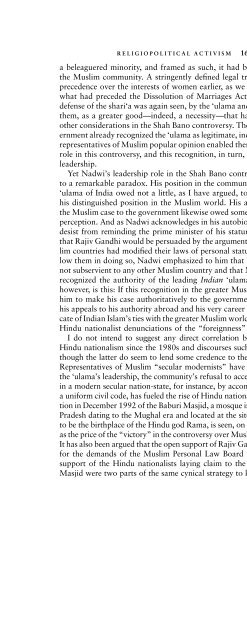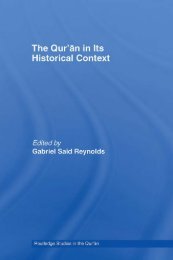Download (1 MB) - Islam and Christian-Muslim Relations: Articles ...
Download (1 MB) - Islam and Christian-Muslim Relations: Articles ...
Download (1 MB) - Islam and Christian-Muslim Relations: Articles ...
Create successful ePaper yourself
Turn your PDF publications into a flip-book with our unique Google optimized e-Paper software.
RELIGIOPOLITICAL ACTIVISM 169a beleaguered minority, <strong>and</strong> framed as such, it had broad resonance inthe <strong>Muslim</strong> community. A stringently defined legal tradition had takenprecedence over the interests ofwomen earlier, as we saw in the case ofwhat had preceded the Dissolution ofMarriages Act of1939; <strong>and</strong> thedefense of the shari‘a was again seen, by the ‘ulama <strong>and</strong> those supportingthem, as a greater good—indeed, a necessity—that had to override anyother considerations in the Shah Bano controversy. The fact that the governmentalready recognized the ‘ulama as legitimate, indeed authoritative,representatives of<strong>Muslim</strong> popular opinion enabled them to play a leadingrole in this controversy, <strong>and</strong> this recognition, in turn, strengthened theirleadership.Yet Nadwi’s leadership role in the Shah Bano controversy also pointsto a remarkable paradox. His position in the community <strong>and</strong> among the‘ulama ofIndia owed not a little, as I have argued, to the perception ofhis distinguished position in the <strong>Muslim</strong> world. His ability to representthe <strong>Muslim</strong> case to the government likewise owed something to that sameperception. And as Nadwi acknowledges in his autobiography, he did notdesist from reminding the prime minister of his stature abroad. Fearingthat Rajiv G<strong>and</strong>hi would be persuaded by the argument that ifmany <strong>Muslim</strong>countries had modified their laws ofpersonal status, India could followthem in doing so, Nadwi emphasized to him that <strong>Islam</strong> in India wasnot subservient to any other <strong>Muslim</strong> country <strong>and</strong> that <strong>Muslim</strong>s elsewhererecognized the authority ofthe leading Indian ‘ulama. 113 The paradox,however, is this: Ifthis recognition in the greater <strong>Muslim</strong> world enabledhim to make his case authoritatively to the government <strong>and</strong> the public,his appeals to his authority abroad <strong>and</strong> his very career as an ardent advocateofIndian <strong>Islam</strong>’s ties with the greater <strong>Muslim</strong> world could not but fuelHindu nationalist denunciations ofthe “foreignness” of<strong>Islam</strong> in India.I do not intend to suggest any direct correlation between the rise ofHindu nationalism since the 1980s <strong>and</strong> discourses such as Nadwi’s, eventhough the latter do seem to lend some credence to the former’s rhetoric.Representatives of<strong>Muslim</strong> “secular modernists” have argued that underthe ‘ulama’s leadership, the community’s refusal to accept the terms of lifein a modern secular nation-state, for instance, by accommodating itself toa uniform civil code, has fueled the rise of Hindu nationalism. The destructionin December 1992 ofthe Baburi Masjid, a mosque in Ayodhya in UttarPradesh dating to the Mughal era <strong>and</strong> located at the site believed by someto be the birthplace ofthe Hindu god Rama, is seen, on this interpretation,as the price ofthe “victory” in the controversy over <strong>Muslim</strong> personal law. 114It has also been argued that the open support ofRajiv G<strong>and</strong>hi’s governmentfor the dem<strong>and</strong>s of the <strong>Muslim</strong> Personal Law Board <strong>and</strong>, later, its tacitsupport ofthe Hindu nationalists laying claim to the site ofthe BaburiMasjid were two parts ofthe same cynical strategy to keep a fragile Con-



